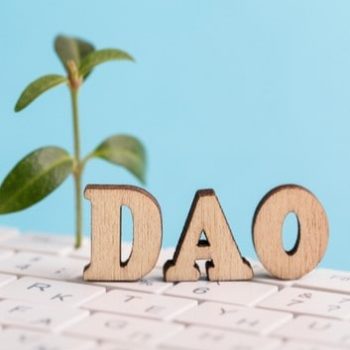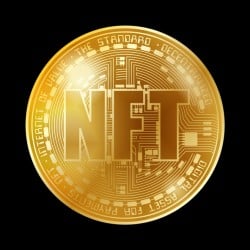Last November, a group of crypto investors decided to try to buy an original copy of the U.S. Constitution which was coming up for auction at Sotheby’s on November 18, 2021.1 But first, they had to solve a problem – the document, one of just thirteen surviving copies of the original printing of the Constitution, was expected to fetch between 15 and 25 million dollars.2 The group didn’t have that kind of cash, but what they did have was knowledge of a cutting edge organizational and fundraising tool called a decentralized autonomous organization (DAO).3
Within a week, the group created the ConstitutionDAO, organized its followers on Discord (a messaging and community platform), and raised roughly $47 million in virtual currency.4 Armed with their new war chest, the group bid on, but ultimately failed to win, the Sotheby’s auction, losing out to a hedge fund billionaire who purchased the copy of the Constitution for $43.2 million (the Constitution DAO had withheld some funds to cover costs associated with winning the auction).5
Following their loss, the creators of the group were faced with what to do with the virtual currency sitting in the DAO’s treasury. Many of the community members sought refunds, only to learn that the transaction costs (also known as gas fees) would eat up much of their original contribution.6 Ultimately, the ConstitutionDAO’s founders decided to shut it down.7 The token issued in connection with the project, originally intended to be used to allow holders to vote on what the DAO would do in the future, lives on, with some holders still hoping to profit.8
What if the ConstitutionDAO had succeeded? Who would have “owned” the copy of the Constitution the group would have purchased? In a later interview one of the founders of ConstitutionDAO, Jonah Erlich, disclosed that the group had partnered with a traditional nonprofit organization that would have had legal custody of the Constitution.9 The fact that this new type of organization would be reliant on a traditional nonprofit provides excellent insight into the emerging world of DAOs. It also gives us an entry point to examine this new structure.
WHAT ARE DAOS?
In a traditional corporation or limited liability company, the organization is formed by filing paperwork with a government office, typically a state’s Department of State. By creating a legal entity, the people behind the organization are protected from liability. When someone sues a corporation over a contract dispute or other liability, the directors, officers, employees, members, and volunteers are not liable individually. Rather, it’s the corporation that must answer for its liabilities.
In a DAO, however, there is no formal legal entity. Built using the same blockchain technologies that underly the virtual currency ecosystem, DAOs are organizations that are never incorporated in any state (with limited exceptions). The founders create the DAO, and it simply exists.
While DAOs actual structures vary, most DAOs issue a token that gives members of the DAO voting rights. Once tokens are issued, in order to make decisions, all token holders are allowed to vote. The idea, touted by DAO supporters, is that this new structure democratizes organizational decision-making, placing it in the hands of the members. An oversimplified comparison would be a for-profit company that has no paid executives or board of directors, making every decision by allowing all shareholders to vote.
Although the ConstitutionDAO is a well-known example, DAOs are proliferating in the nonprofit community. Here are a few interesting examples: DiatomDAO is raising support to protect the oceans;10 KlimaDAO hopes to speed up solutions for climate change by increasing the price of carbon assets;11 Bloomeria is using NFTs to increase biodiversity; 12 and The Regen Network is issuing a token as part of a group of entities to realign the agricultural economy with ecological health.13
While each of the foregoing organizations uses the language of the DAO and decentralization, they also demonstrate how the DAO community encompasses many different structures. For instance, the Regen Network is comprised of a traditional C-Corporation, a traditional 501(c)(3) public charity, and a decentralized DAO program.14 The DiatomDAO is purely a decentralized entity, “owned and directed” by its token holders (see more on this below). The ConstitutionDAO, while operated as a decentralized DAO, would have relied on a traditional 501(c)(3) public charity (one named EnDAOment15) had it won the Sotheby’s auction and needed a legal entity with which to hold the copy of the Constitution. As you can see, while many groups use the mantle of “DAO”, the term encompasses many different structures.
WHAT ARE THE BENEFITS OF DAOS?
Now that we’ve discussed what DAOs are, and seen some examples, let’s step back to consider what DAO proponents like about the structure. In theory, a pure DAO offers each supporter the opportunity to participate in the group’s decision-making. If a member of a charitable DAO wants to make a grant, they would propose it to the rest of the DAO community. The members then hold a vote. Using this structure, a DAO represents a more direct form of organizational decision-making and, for donors, more direct-action philanthropy.
Further, by avoiding any legal structure, some DAO proponents believe this new structure will give DAOs greater flexibility. Without a state’s laws dictating how decisions have to be made or how boards have to be structured, a DAO might be nimbler. Some libertarians believe that DAOs, who have no real jurisdictional nexus to any state, might even be able to avoid generally applicable laws.16
WHAT ARE THE DRAWBACKS OF DAOS?
While there is a lot to be excited about by DAOs, they use an organizational structure in its infancy, with many more questions than answers. One critique is that the voting structure adopted by most DAOs (1 token = 1 vote) replicates existing problems with shareholder structures, namely, that the larger shareholders control organizational decision-making, alienating smaller shareholders. If one person holds 60% of the DAO’s tokens and the DAO implements a 50+1% vote threshold decision-making could be even more centralized than it would be in a traditional organization with a board and executives who can counterbalance a large shareholder’s interests. The DAO community has proposed some possible solutions to this problem, such as limiting votes to one per token holder, or creating non-transferable tokens to limit token holder hoarding. Each of these solutions have drawbacks, but they could drive decision-making closer to the idealized notion of the DAO.
Another issue is the legal uncertainty of DAOs. Assume that the libertarian notion that DAOs are legally unaccountable as organizations, since they are not organized in any state nor do they have any other jurisdictional nexus with any local, state, or federal government. That might put the DAO beyond the reach of regulators and law enforcement, but it would not exempt the individuals participating in or working for the DAO, all of whom are real people subject to normal laws. Actually, the idea of a group of people running an unincorporated organization isn’t new. In New York, for instance, such an entity would be deemed an “unincorporated association.” Under longstanding common law, an unincorporated association is not legally separate from the members who comprise it.17 That means that members of a DAO could be taking on direct legal risk from their participation in the DAO. If the DAO were to breach a contract, discriminate against an employee, or cause other real-world harm, the DAO’s members might be jointly and severally liable.
It’s also an open question whether regulators will share the libertarian view that DAOs are not subject to local, state, or federal laws. It wouldn’t be surprising to see the Securities and Exchange Commission (SEC) bring an enforcement action against a DAO, given that it has already notified the Decentralized Finance (DeFi) community that it considers many DeFI products analogous to products regulated by the Commission.18 The SEC has already brought an enforcement action against a Wyoming organization operating under the guise of a DAO, albeit only after the entity sought SEC approval to register two tokens as securities.19
Finally, DAOs in the philanthropic sector face the additional hurdle of providing tax-deductibility to donors. In general, a contribution to a non-charitable intermediary doesn’t allow a donor to take a tax-deduction. The answer to that question isn’t clear20 as it depends on how the entity is treated for tax-purposes, whether its distributions would otherwise qualify for a tax-deductions, and whether it is considered an agent for the donors or beneficiary charities. A person hoping for a tax-deduction should contact a tax professional to examine the particular DAO’s structure and the taxpayer’s circumstances. To date, I’m unaware of any DAO specifically advertising the deductibility of contributions to its treasury, nor having considered tax-deductibility as part of their DAO structure (except, of course, for DAOs like Endaoment and Regen Network that operate using a traditional 501(c)(3) corporate structure).
WHAT’S NEXT FOR DAOS?
Despite the novelty of and the uncertainty surrounding DAOs, their popularity is undeniable. This was exemplified by the incredible enthusiasm around ConstitutionDAO. Taking advantage of the late 2021 surge in the value of many cryptocurrencies, DAOs provide an opportunity for the crypto community to put its assets to work in novel ways, including philanthropy. While they are evolving, DAOs will likely persevere, barring regulator intervention to shut them down. Donors and charities looking to participate in the DAO community should do so carefully, and with the benefits of advisors familiar with the DeFi and DAO space.
1 https://www.sothebys.com/en/digital-catalogues/the-constitution-of-the-united-states
2 Id.
3 https://www.theverge.com/22820563/constitution-meme-47-million-crypto-crowdfunding-blockchain-ethereum-constitution
4 https://www.constitutiondao.com/
5 https://www.vice.com/en/article/qjb8xv/hedge-fund-ceo-who-bailed-out-gamestop-short-seller-bought-the-constitution
6 https://www.theverge.com/2021/11/24/22800995/constitutiondao-refund-progress-steep-gas-fees-cryptocurrency
7 https://www.theverge.com/2021/11/23/22799192/constitutiondao-shutting-down-lost-auction-refunds
8 The latest price quote for the PEOPLE token can be found at https://coinmarketcap.com/currencies/constitutiondao/.
9 https://www.theverge.com/22820563/constitution-meme-47-million-crypto-crowdfunding-blockchain-ethereum-constitution.
11 https://www.klimadao.finance/
14 https://www.regen.network/faq/organization
16 For instance, in his conversation on the Deep Background podcast, Erik Voorhees argued that a DAO could avoid the difficulties of employment law because no states employment laws would apply. https://www.pushkin.fm/episode/whats-the-deal-with-decentralized-autonomous-organizations/
17 See, generally, New York Elec. C. Assn. v. Local Union No. 3, (NY Sup. Ct. 1941), available at https://casetext.com/case/new-york-elec-c-assn-v-local-union-no-3
18 https://www.sec.gov/news/statement/crenshaw-defi-20211109
19 https://www.sec.gov/news/press-release/2021-231; https://www.coindesk.com/policy/2021/11/11/sec-stops-wyoming-based-dao-from-registering-2-digital-tokens/.
20 For an excellent discussion, see Prof. Samuel Brunson’s blog post https://lawprofessors.typepad.com/nonprofit/2021/11/charitable-daos-revisited.html.
- Perlman & Perlmanhttps://perlmanandperlman.com/author/nancyisrael/
- Perlman & Perlmanhttps://perlmanandperlman.com/author/nancyisrael/
- Perlman & Perlmanhttps://perlmanandperlman.com/author/nancyisrael/
- Perlman & Perlmanhttps://perlmanandperlman.com/author/nancyisrael/








